Bob Fox connects with Louise Watts of Transition Hub to learn more about how she uses space in WeWork locations to support her business goals and her thoughts on returning to work post-COVID-19.
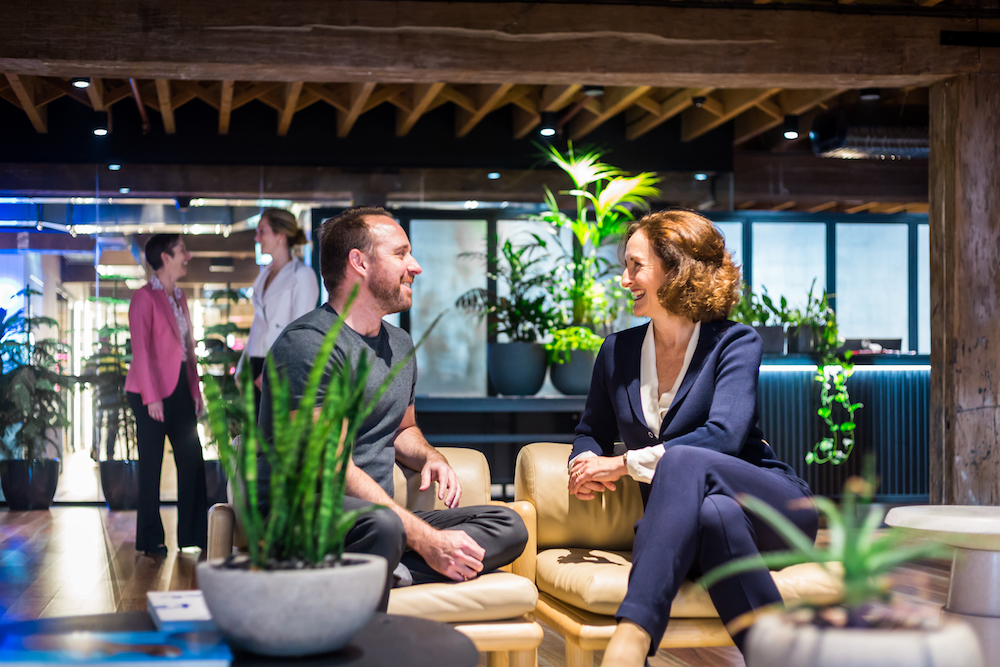
Bob Fox: Tell us a little bit about Transition Hub and the work that you do.
Louise Watts: Transition Hub is an innovative way for organizations to engage their in-house talent to upskill their workforce. It’s an exciting, inspiring and scalable model for people to reimagine their future. We also train expert coaches to host Transition Hubs in WeWork locations globally. After 20 years of success, developing global professional development programs for organizations, this is our answer to transition workforces into the future of work.
We’ve been able to scale our work globally by working in the client space training their future leaders as ‘champions’ to host our global professional development programs. Champion weeks are personal development accelerators which prepare talented leaders with the coaching and facilitation skills to take their people forward.
Our team of founding coaches come from a range of creative backgrounds, many from the performing arts, so we truly understand what it is like to work as an ensemble team of experts. Today, the Transition Hub ethos builds on that, bringing a scalable way for organizations to upskill their people, through in-house career and skills workshops. When people understand how they can use their strengths to help others, it is absolutely transformational.
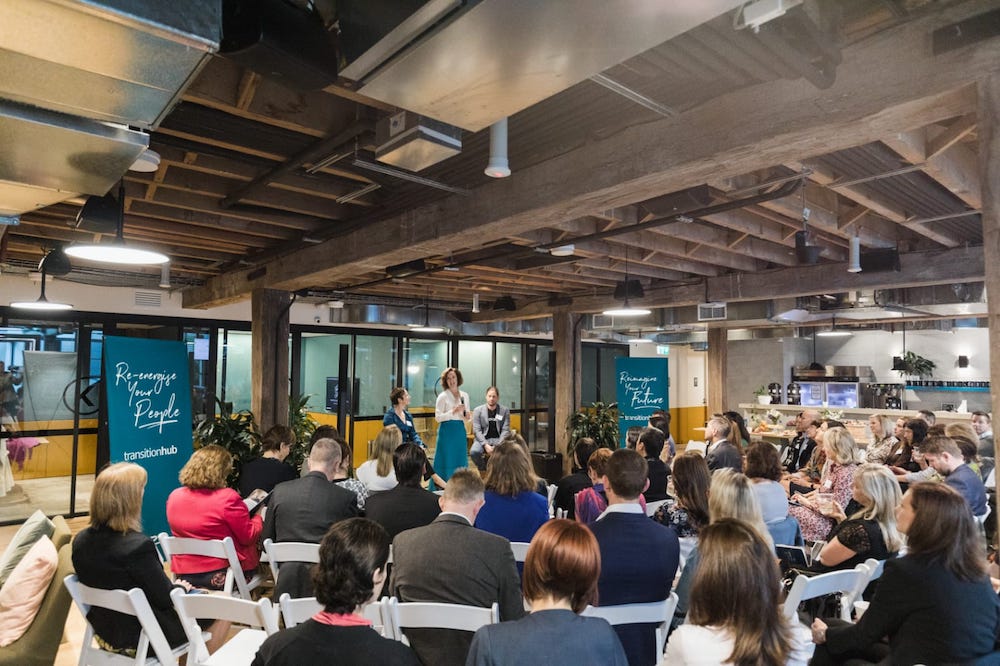
Bob Fox: When did you identify the need for Transition Hub?
Louise Watts: Back in 2016, we began to think deeply about the future of work and how so many in the workforce would need to reimagine their future, either by choice or because their role would be automated. We knew we had the foundational methodology that could be applied seamlessly to people preparing to upskill to move forward.
The next step was to find an inspirational space for people to step out of their usual environment and spend a week as part of a diverse cohort. Bringing people into the future of work through upskilling and humanizing roles, requires a plan of global dimensions (McKinsey suggested bigger than the Marshall Plan after WWII) and we needed a global brand partner to become the home of Transition Hubs.
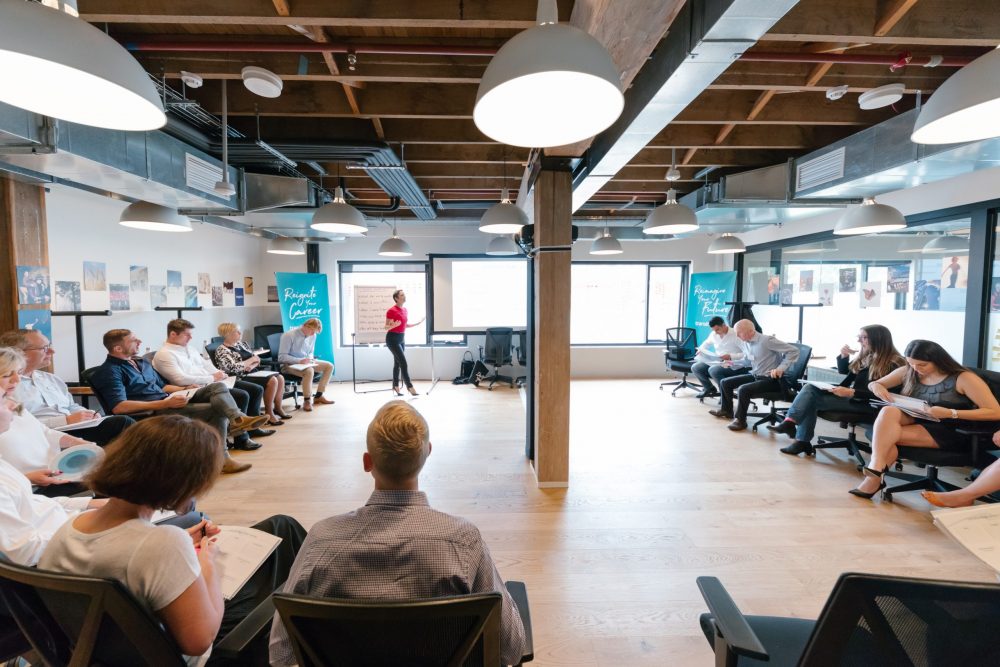
In 2017, I approached WeWork just as they were starting to expand their reach into many countries. WeWork had come into Australia in 2016 and we had been watching the global build out. A good connection lead me to the executive team in New York and we agreed that WeWork could become the global home for Transition Hubs. The WeWork team in Australia, led by Balder Tol, showcased an incredible series of pilots with us. From day one, Balder saw the Transition Hub vision and the need for people to reimagine their future in an inspiring, community focused environment.
Today, as the whole world moves through the unforeseen transition caused by COVID-19, large numbers of staff are working from home whilst others navigate back to the office. This period has served to highlight the importance of people reconnecting to have meaningful conversations that spark new ideas. Transition Hubs give people the confidence to engage and plan for their future.
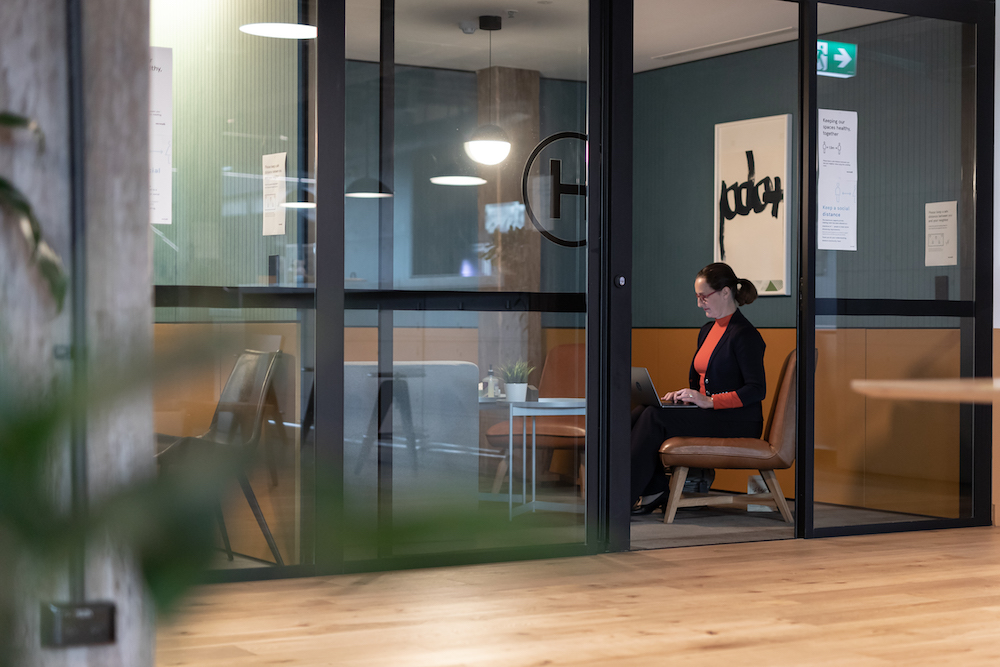
Bob Fox: It sounds like you have people that are distributed all around the world. How many employees do you have and is there a central location that everybody works out of?
Louise Watts: So far, we have accredited 70 coaches to deliver Transition Hub in Australia and we’ve begun conversations with coaches in five or six different countries. The next step is to train coaches in every major city to host Transition Hub at WeWork locations. Additionally, we are now training future leaders to host Transition Hub within their own organizations. By offering the in-house model, organizations can engage their people and play their part in the global upskilling plan. Organizations like Degreed are bringing fantastic skills to organizations, and we are developing the human advocacy required to guide people towards those skills.
Transition Hub accredited coaches are often specialist practitioners who run their own coaching practices in their home cities. It is our pleasure to bring them together to work as ensemble teams after training them in the Transition Hub methodology. Within our framework we have five specialist coach roles and the team work together to deliver immersive five-day programs, which become a springboard for ongoing learning. On every program we have a personal brand coach, a communication coach, a performance coach, a health and well-being coach, and a career coach.
Bob Fox: It sounds like they’re all professionals in their own right – Is there a culture that exists among the coach group?
Louise Watts: Yes, our High Performance Coaching team have been working together now for 20 years now and they absolutely set the standard for teamwork and professionalism. Coming from the performing arts, there is a culture that’s instilled in you, ‘the show must go on’ – and you truly understand the meaning of resilience and transition. One day you are the soloist, and the next, you are part of the corps de ballet. It’s a great metaphor for life, and the future of work. The culture and spirit we bring to Transition Hub coaches is one of professional generosity. We select coaches to become part of Transition Hub for their genuine care and concern for others’ well-being and development.
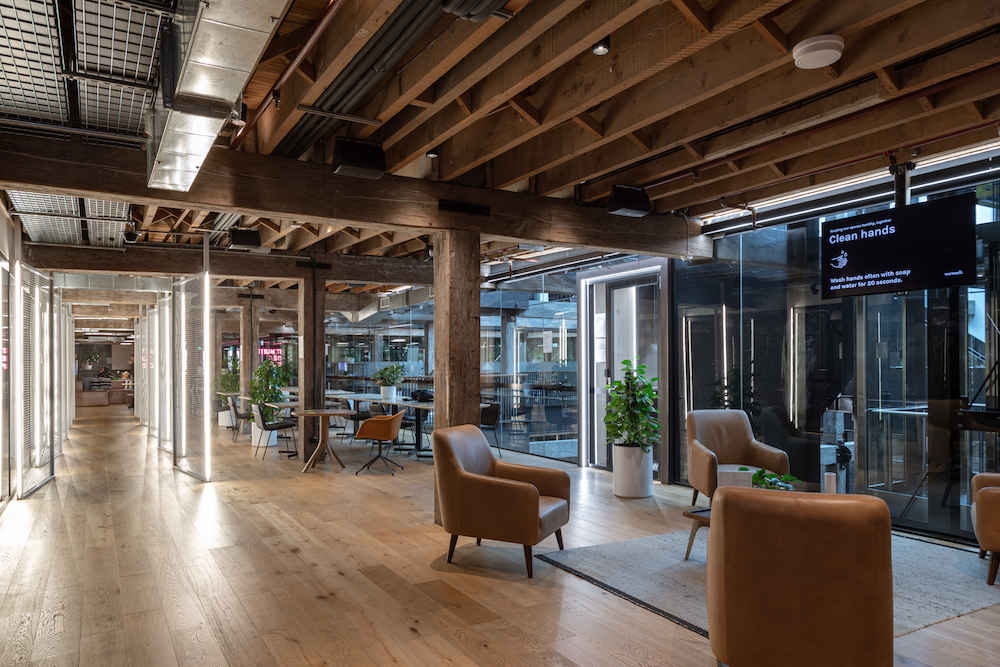
Bob Fox: How do you look at space and how do you use space in terms of guiding people and coaching them through these transitions.
Louise Watts: When I walk into a space, I pay attention to the natural light, the sense of scale, and the energy it inspires. A really good example of how space plays such a part in the experience of people attending Transition Hub, is the WeWork location we often use Sydney. It is located in Pyrmont; an inner-city suburb of Sydney and the building is a transformation of a grand old wool shed. As you can imagine, it is huge and the beams are powerful and commanding. People arrive and immediately feel safe and energized. On a daily basis, people say how much the space resonates with the transformation they personally are making.
Bob Fox: In that space, did you get to put your own touch on it or was it something that you just embraced?
Louise Watts: We ‘dress’ our space with Transition Hub branding and we set the scene within a large classroom at each WeWork location. We love to use adaptable spaces including a main room and smaller breakout rooms as the nature of the week is flexibility, adaptability, and creativity. WeWork are very well known for their community areas and open spaces, which are important to us so people can take a seat on a couch and have a conversation. They are presently doing a great job of welcoming people back into their spaces, in a safe and appropriately distanced manner.
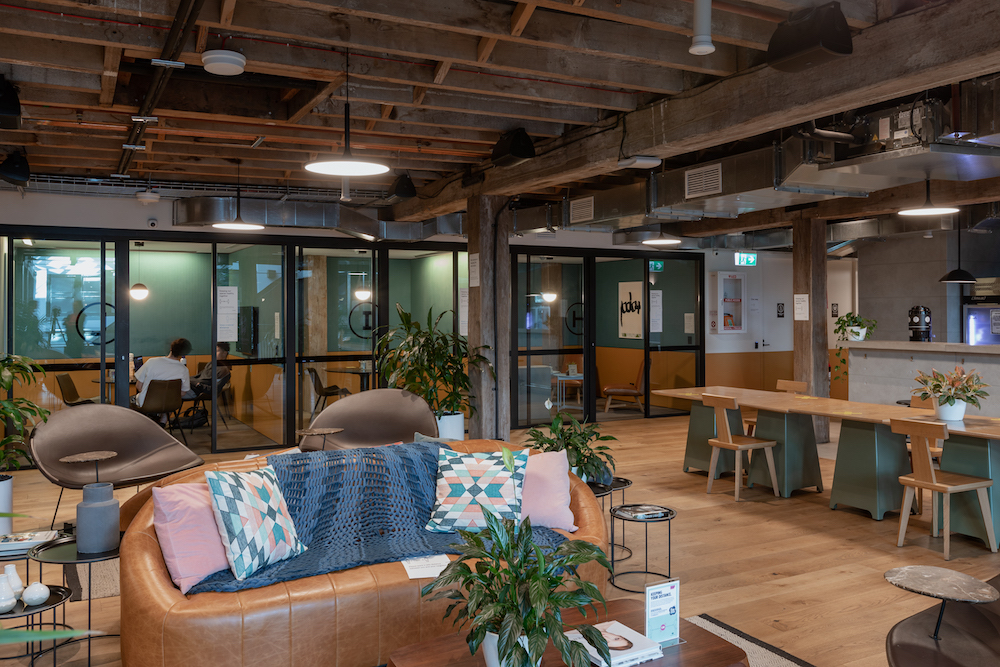
Bob Fox: That’s great – is there something that you want to communicate to people through the space and is that something that you can actually duplicate from location to location?
Louise Watts: During our time, we’ve created inspirational training programs in some most unusual places. Sometimes we are training around posts in the middle of a room or creating an atmosphere on a mezzanine level of a hotel. It is crucial that we bring calm to chaos, so even if a space is far from perfect, we make it work.
With the luxury of working in WeWork locations that are generally set up on big footprints, we can duplicate the Transition Hub environment in each location. We put a lot of effort into making sure our coaches set the scene for people to feel engaged and welcomed. Organizations learn a lot from us in terms of delivering training experiences that stay with people for the rest of their career. To do that, we keep reinventing the space within the training room, using different furniture configurations, treating the classroom more like a performance studio.
Bob Fox: Do you have any metrics or measures that you use to judge how much space you need?
Louise Watts: Transition Hub weeks, range from 20 – 30 person cohorts, depending on the size of the room available and how many people we can safely bring together as we transition through the COVID-19 recovery. We like a substantial floor space as people are constantly ‘in action’ putting skills into practice and feeling their confidence grow day by day.
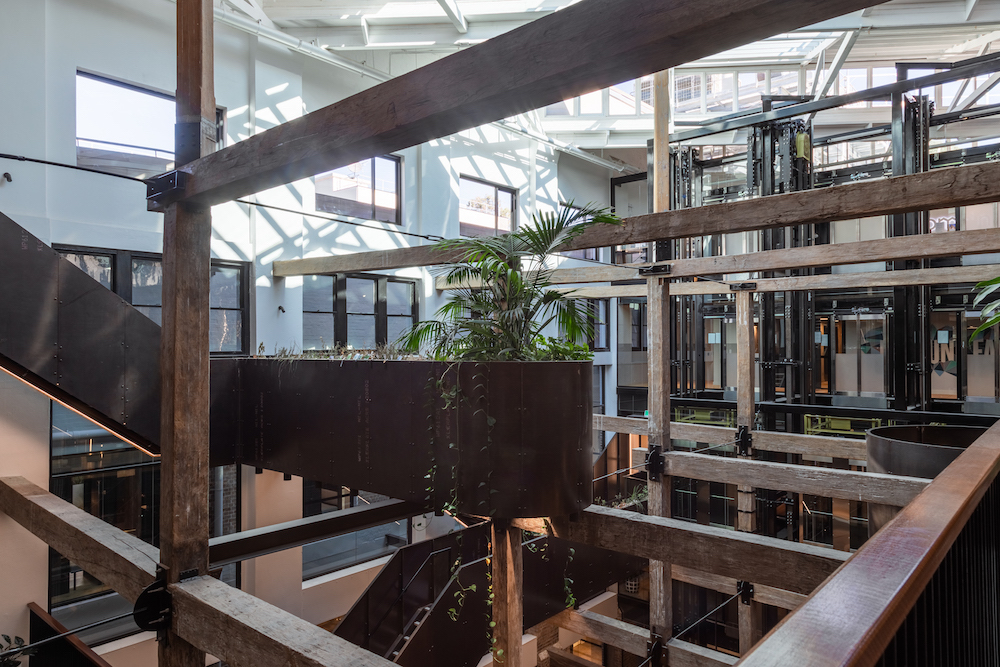
Bob Fox: As we’re going through the COVID-19 pandemic and trying to get back into the workplace, what’s going to be important for you and your people as you begin to think about returning back to work?
Louise Watts: For our global and regional cohorts, we are presently delivering programs online. Zoom has given us the technology to bring people together, whilst it is safer to be apart. Locally, we’ve been very lucky here in Australia, so far, as we’ve had low numbers of cases and we were guided into quarantine measures very quickly. Now, in August, we are starting to see some groups coming back into the workplace and we are playing our part in bringing people together for purposeful reconnecting experiences. I do think that this period, whilst people have been disconnected from their usual physical spaces has highlighted for people how much they appreciate the dynamic of a workspace and the power of connecting in person.
As workforces all over the world go forward with a blend of working from home and working in the office, the idea of the ‘local space’ such that WeWork are proposing, is a very helpful option for people who don’t want to commute into head office but they don’t want to work solo every day either. Organizations will start to assess if we need a space for everybody all at once but that’s not new. If you think about PwC in New York who have 20,000 members and only have a 5,000 person space in central Manhattan. They don’t expect that everybody will be there every day of the week and they are right. Space should be a place that people want to go to.
People have been reminded that human energy adds a big contribution to productivity and teamwork. Prior to COVID-19, people were so exhausted running in out of meetings and constantly traveling – now, we have the time and opportunity to develop the right mindset, to work with greater balance. We really reinforce that through the Transition Hub experience.
The future of work is most definitely human, so we need to ensure we are all best placed to move forward with energy and enthusiasm for work that is meaningful to us.

